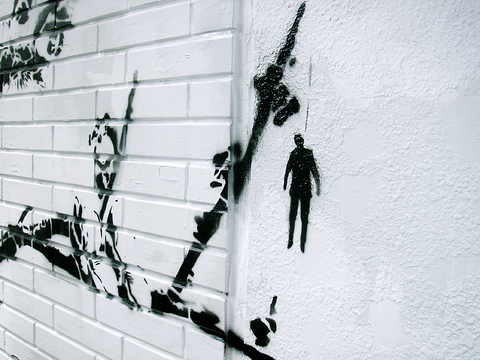Ever since Chang Shuo-yin (張碩尹), 23, was a student at the Department of Advertising at National Chengchi University (政治大學), he was taken with spraying graffiti on the walls of his campus. He also led a group called the Mountain Guerillas (上山打游擊), who converted an empty building -- refered to as "The Ruin" by local graffiti artists and connoisseurs -- into a repository of graffiti art.
Under the tag Bbrother, taken from George Orwell's novel Big Brother, Chang continues to work as a graffiti artist with a clear political bent. His vivid mural of a farmer pointing a gun to his own head, with the slogan "cheap rice hurts farmers" (穀賤傷農), is a protest against Taiwan's WTO membership. The image of a baby with its penis tied in a knot is a provocative critique of Taiwan's laws on assemblies, processions and demonstrations (集會遊行示威法). His graffiti can be seen in various parts of Taipei, including the alleys behind Eslite Book Stores (誠品台大店) near National Taiwan University (NTU), and The Ruin, which he and others wrested from police as a de facto base for their graffiti art. In spite of disagreements with local authorities regarding whether the artists could spray in The Ruin, the police have largely let them convert the abandoned building into their unofficial studio.
Lee Ming-tsung (李明璁), assistant professor in sociology at NTU, suggests that graffiti in Taiwan serves as a safety valve venting social anger, preventing young artists' pent up aggression from being expressed through violence.

PHOTO: GINGER YANG, TAIPEI TIMES
Bbrother's take on this form of street art is that it simply satisfies "the primitive desire to paint on something solid, just like ancient people painted their caves."
Few graffiti artists take their work as seriously as Bbrother, but such committed urban artists, even in limited numbers, are spearheading a genre all their own, fusing pop-art graphics with elements of traditional Chinese painting. Interestingly, while some condemn graffiti art as vandalism, others view it as a catalyst for social reform. "Graffiti cannot provide details of an issue, but it can draw attention, [provoking dialogue]," Lee said.
Big businesses have tried to appropriate the cachet of graffiti for their marketing strategies and products. Even Bbrother does occasional commercial work, but is discreet about it, perhaps aware that the anti-capitalist messages often contained in graffiti could be easily corrupted by such commercialization. Bbrother insists that he wants to keep graffiti distinct from other art genres.
Taipei has long been portrayed as a multicultural city in which the freedom of expression thrives. "I have rarely met a policeman or angry resident while painting on a wall. The police won't interrupt you if you act like a young man who loves art," Chang says. Such a statement suggests that the city indeed possesses a high threshold for expression, and that Taipei residents are very tolerant of graffiti as an artform and its proponents.

On April 26, The Lancet published a letter from two doctors at Taichung-based China Medical University Hospital (CMUH) warning that “Taiwan’s Health Care System is on the Brink of Collapse.” The authors said that “Years of policy inaction and mismanagement of resources have led to the National Health Insurance system operating under unsustainable conditions.” The pushback was immediate. Errors in the paper were quickly identified and publicized, to discredit the authors (the hospital apologized). CNA reported that CMUH said the letter described Taiwan in 2021 as having 62 nurses per 10,000 people, when the correct number was 78 nurses per 10,000

As we live longer, our risk of cognitive impairment is increasing. How can we delay the onset of symptoms? Do we have to give up every indulgence or can small changes make a difference? We asked neurologists for tips on how to keep our brains healthy for life. TAKE CARE OF YOUR HEALTH “All of the sensible things that apply to bodily health apply to brain health,” says Suzanne O’Sullivan, a consultant in neurology at the National Hospital for Neurology and Neurosurgery in London, and the author of The Age of Diagnosis. “When you’re 20, you can get away with absolute

May 5 to May 11 What started out as friction between Taiwanese students at Taichung First High School and a Japanese head cook escalated dramatically over the first two weeks of May 1927. It began on April 30 when the cook’s wife knew that lotus starch used in that night’s dinner had rat feces in it, but failed to inform staff until the meal was already prepared. The students believed that her silence was intentional, and filed a complaint. The school’s Japanese administrators sided with the cook’s family, dismissing the students as troublemakers and clamping down on their freedoms — with

As Donald Trump’s executive order in March led to the shuttering of Voice of America (VOA) — the global broadcaster whose roots date back to the fight against Nazi propaganda — he quickly attracted support from figures not used to aligning themselves with any US administration. Trump had ordered the US Agency for Global Media, the federal agency that funds VOA and other groups promoting independent journalism overseas, to be “eliminated to the maximum extent consistent with applicable law.” The decision suddenly halted programming in 49 languages to more than 425 million people. In Moscow, Margarita Simonyan, the hardline editor-in-chief of the